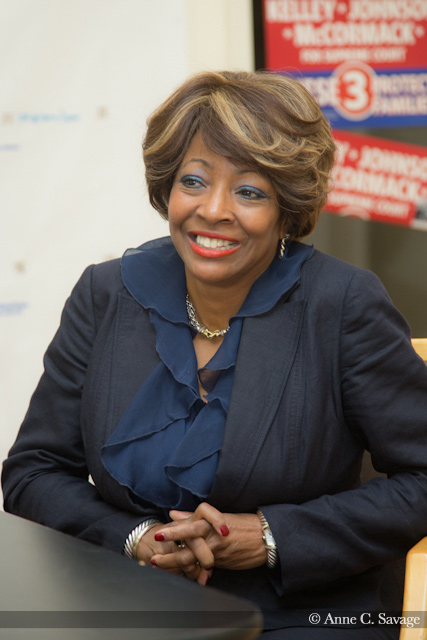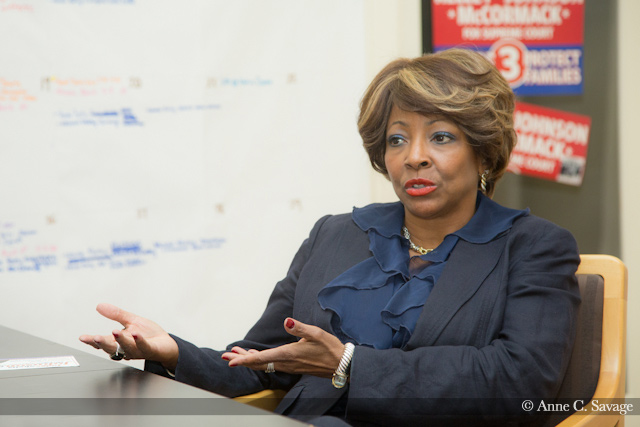 Judge Shelia Johnson, who serves in the 46th District Court that covers the diverse southeastern Michigan communities of Southfield, Lathrup Village, Bingham Farms, Beverly Hills, Franklin and Southfield Township, is not your ordinary judge. Judge Johnson was born and raised in Michigan and spent time as a child in the segregated South. Through these life experiences, she as seen how justice is administered from several unique vantage points. She has also seen how justice is often denied and has spent her life trying to correct that.
Judge Shelia Johnson, who serves in the 46th District Court that covers the diverse southeastern Michigan communities of Southfield, Lathrup Village, Bingham Farms, Beverly Hills, Franklin and Southfield Township, is not your ordinary judge. Judge Johnson was born and raised in Michigan and spent time as a child in the segregated South. Through these life experiences, she as seen how justice is administered from several unique vantage points. She has also seen how justice is often denied and has spent her life trying to correct that.
As one of three women endorsed and then officially nominated by the Michigan Democratic Party for the state Supreme Court (along with Bridget Mary McCormack and Connie Marie Kelley), Shelia Johnson would bring a unique perspective to the Court. She has spent time as a federal law clerk, 18 years as an attorney and nearly ten years as a District Court justice. She is the first female African American judge in Oakland County having defeated a 17-year incumbent for the position and is currently serving her second term. She will face Justice Brian Zahra on the November ballot to fill a partial two-year term left when Justice Maura Corrigan resigned in 2011.
I sat down with Judge Johnson last week to talk about her candidacy. I brought up the impressive number of awards and recognitions she has earned over the years:
- First African American President of Law School Student Senate
- Past President of the Association of Black Judges of Michigan
- Past Vice President of the National Association of Women Judges (NAWJ)
- 2009 recipient of the NAWJ Mattie Belle Davis Award
- 2006 recipient of the Southern Oakland County NAACP Member of the Year Award
- 2008 recipient of the Powerful Woman of Purpose Award from the Rhonda Walker Foundation for professional achievement in the legal field and for commitment to community service
- 2005 recipient of the Native Detroiter Magazine award for outstanding community service
I asked her which of these award she was most proud of. She paused for a moment and then smiled.
“That would have to be the Mattie Belle Davis Award. It’s a national award that recognizes female judges. It was such an honor and privilege to be recognized by the National Association of Women Judges, it was a proud moment for me.”
We talked about the endorsement and nomination of Supreme Court judges by the political parties. I asked her about her feelings on this.
“Well, it’s part of the process,” she said. “But, in some ways, I think it sort of taints the process. The Courts are supposed to be sort of special, above politics. It’s the one place where it shouldn’t matter who you are or where you’re from; everyone is treated as equal. At the same time, it does help people to understand the perspective of the candidates, so it serves a purpose. And the Michigan Democratic Party is helping to get our names out to the voters, which is good.”
The three judges nominated by the MDP are all very strong candidates with different backgrounds and perspectives. I asked Johnson what about her background and experience distinguishes her from the others.
“Well, first of all,” she said, “I think we’re all a lot more alike than we are different. We all came to be here from different backgrounds but we also all have similar views. My background covers all areas of the justice system. I’ve been a judge behind the bench. I’ve worked at a firm and I’ve worked in commercial litigation. I worked for myself in my private practice representing private citizens. I’ve worked in criminal courts, I’ve worked in civil courts. I’ve brought civil rights claims in federal court. So I really understand the justice system from all perspectives.
“I knew I wanted to be a lawyer and a judge from when I was just a little girl. I was born in Michigan but my grandparents were from the South and, when I was an infant, I moved to the South with my mother for a time while my father went to school. My grandfather had moved to Mississippi to be a teacher for the children of sharecroppers so both he and my grandmother were well respected in the community. As I grew up, we would travel to visit my grandparents in both Tennessee and Mississippi. When we drove down there, we would have to bring our own food because this was the segregated South and we weren’t allowed to eat in the restaurants. We had to bring our own toilet paper and go off into the woods to use the bathroom. So, I saw first hand how it was to be treated unequally.

“I decided to spend my life making a difference and trying to change that. And I have. I have done civil rights work, pro bono work for poor people and have helped women who were victims of domestic violence. I never knew I would one day have the chance to run for the highest court in the state!
“I think that it’s very important for the Court to have people that understand the culture and experiences of the people who come before them. It helps you to be more fair.”
Referring to the case of Rebecca Williams Jackson, I asked Judge Johnson about Jackson’s situation where she was literally too poor to afford to be able to have her case heard by the Supreme Court because she couldn’t afford the multiple Affidavits of Merit that are required.
“Well, I don’t know the specific details of that case,” she answered. “But the Affidavit of Merit rules are in place, of course, to avoid frivolous lawsuits. However, if we wanted to change that, it would be up to the Legislature to do it because those are the rules under current law.”
“What are some of the things you would like to champion if you become a state Supreme Court justice,” I asked.
“First,” she replied, “I think it’s important that we restore civility and congeniality between the Supreme Court justices. It’s just gotten so bad over the past few years and even judges from the same side don’t get along sometimes. We all need to respect each other.
“Second, I would like to work to make the process more understandable to people who use the courts. For example, I would like to see computers set up in our court buildings where people could watch videos that explain the process. The courts are supposed to treat everyone equally but if people don’t understand how things happen, they aren’t treated fairly and fairness is the most important thing.”
The issue of educating citizens on the legal system is one that Judge Johnson talks about on her website:
Above and beyond the duties in the courtroom, I believe that judges must reach out into the community to educate citizens on the law and the legal process, in order to foster an understanding, comfort, trust and a sense of fairness with the judicial system. I frequently particpate as a speaker for community events and on panel discussions on legal issues in furtherance of this goal.
“Third,” Johnson went on, “We need to take a good look at how legal representation is assigned for people who cannot afford a lawyer. It varies widely from place to place and sometimes people are not getting good representation. We need a better system so that, no matter where you are or what your situation is, you can get a good lawyer to protect your rights and represent you before the court. This is something that Governor Snyder has taken an interest in and I commend him for it.

“Finally,” she finished, “I think we need to change some of the rules to make things more transparent. For example, in my district, people were getting notices from collection agencies that they had never heard of. Maybe they had defaulted on a Home Depot credit card years back but that debt had been sold multiple times and now they are getting a letter from a company and thinking, ‘That’s not about me’, and just ignoring it. We changed the rules to make it more transparent so people understood what is going on.”
We finished with me asking Judge Johnson what she wants Michigan voters to know about her approach to the law.
“We need a strong legal system that people can trust and that everyone has equal access to,” she answered. “It’s important that plaintiffs have the ability to obtain justice if they are harmed. But it’s equally important that defendants have strong representation and are treated fairly. If they don’t, our system is not balanced and people will not trust it. Everyone who comes before the court should be treated equally no matter where they come from, who they are, or how much money they make. Only then will we have a justice system in our state that people can have confidence in.”
Judge Shelia Johnson is a remarkable woman and a powerful candidate for the state Supreme Court. Her experience as a trial lawyer, a corporate lawyer, AND as a judge make her eminently qualified for the position. However, her life experiences and the work that she has done on behalf of everyday citizens are equally important. As someone who experienced first hand the scourge of racial segregation, prejudice and inequality, Judge Johnson knows how important our legal system is and how critical it is that it be fair to everyone who comes into contact with it. She is extremely knowledgeable but, at the same time, down to earth and approachable.
You can visit Judge Johnson’s website HERE, like her Facebook page HERE, and follow her on Twitter HERE.
Don’t forget that, despite the fact that the Republican and Democratic Parties endorse & nominate state Supreme Court candidates, the judges are actually in the NON-PARTISAN section of the ballot, along with the ballot proposals. If you vote a straight ticket, you still need to turn the ballot over and vote in the nonpartisan section. Because there is so much on the nonpartisan section of the ballot in Michigan this year, many of use are recommending that you (a) take a piece of paper with you into the voting booth with all of the judges and ballot proposals listed so that you don’t make any mistakes and (b) that you fill out the nonpartisan section first so that you don’t miss anything.
Before we said our goodbyes, I asked Judge Johnson if there was anything else she wanted to say that we hadn’t covered.
“Yes!” she said. “Make sure people know that when they go to vote ‘Before you give your ballot back, VOTE for Kelley, Johnson and McCormack‘!”
[Photo credits: Anne C. Savage, special to Eclectablog]



